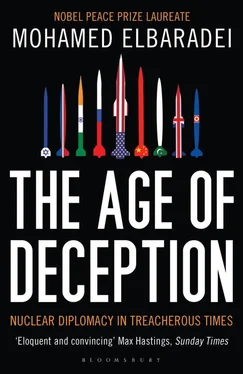In a Newsweek article entitled “The Dilemma of Dissent,” and in his recent book War of Necessity, War of Choice , Richard Haass writes that, already in July 2002, he had discussed with Rice his concern about what he saw as preparation for war in Iraq. According to Haass, before he got very far, Rice stopped him. “You can save your breath, Richard. The President has already made up his mind on Iraq.” Haass adds that “the way she said it made clear [Bush] had decided to go to war.” [23] Richard Haass is the current president of the Council on Foreign Relations and, at the time of the Iraq invasion, was a close adviser to Colin Powell. His article appeared in Newsweek on May 2, 2009. His book, War of Necessity, War of Choice: A Memoir of Two Iraq Wars, was published by Simon and Schuster in 2009.
The same has been implied by other insider sources of information. The British ambassador to Washington, Sir Christopher Meyer, has alleged that the decision to go to war was made in 2002, at Camp David, in a meeting between Blair and Bush. Multiple other reports have suggested that, in the wake of the September 2001 terrorist attacks in the United States, the neoconservative obsession was to penalize a Muslim, and preferably an Arab, country, with Iraq the chosen target. In these renderings, the Iraq War was a war of ideology, motivated by the fantasy of establishing Iraq as an oasis of democracy that would, in turn, transform the geopolitical landscape of the Middle East.
Both Blair and Bush have indicated that regime change was at the heart of the motivation to go to war, regardless of the justification cited. Together with a number of their key associates, they significantly inflated the imminence of the threat posed by Saddam Hussein’s weapons of mass destruction, weapons which in fact did not exist. [24] In testimony to the Chilcot inquiry, Blair said that his support for the U.S. action was prompted by the fear of “disastrous consequences for a tough stance on WMD and its proliferation—and for [the UK’s] relationship with the U.S.” Blair also described telling Bush in late 2001 that “if [regime change] became the only way of dealing with this issue, we were going to be up for that.” In mid-2002, when Colin Powell wrote in a memo that “We need to make the case…. We need to have the sort of Rolls-Royce information campaign we had at the end of Afghanistan before we start in Iraq,” Blair added in the margin, “I agree with this entirely.” Richard Norton-Taylor, “Tony Blair’s Promise to George Bush,” Guardian, January 21, 2011, retrieved at www.guardian.co.uk/politics/2011/jan/21/tony-blair-george-bush-iraq/ .
In September 2003, Dick Cheney gave an interview on MSNBC’s Meet the Press in which, in response to pointed questions, he acknowledged that he had “misspoken” before the war. “We never had any evidence that [Saddam Hussein] had acquired a nuclear weapon.”
Bush and Blair similarly promoted statements that proved to have little basis in fact, such as touting Iraq’s import of uranium from Niger based on a transparent forgery (Bush), or declaring Iraq’s capability to launch a chemical weapons attack in forty-five minutes (Blair). Both were deliberately selective in their use of the available facts. And both presided over a war in which, time after time, bombing campaigns and armored assaults made little attempt to protect the civilian population against the indiscriminate use of force, referring euphemistically to civilian deaths and injuries as “collateral damage.”
What should be done about this troubling litany? Should the United Nations request an opinion from the International Court of Justice as to the legality of the Iraq War? If the answer is that the war was in fact illegal—and moreover, if consideration is given to the massive civilian casualties incurred—should not the International Criminal Court investigate whether this constitutes a “war crime” and determine who is accountable? [25] If the prosecutor of the International Criminal Court were to issue an indictment against specific individuals, then any country party to the convention could legally arrest them if they traveled to that country.
Should Iraq request reparations at the International Court of Justice, or another forum, for the damages incurred during a war launched in violation of international law and on the basis of falsehoods?
If we are to live by the rule of law, then the prosecution of war crimes should not be limited to those who lose—the Slobodan Miloševićs of the world—or to the Omar al-Bashirs, who originate from poor and long-oppressed regions. Legal norms, to retain legitimacy, must be uniform in their application. Otherwise, as an international community, we are guilty of applying double standards.
Do we, as a community of nations, have the wisdom and courage to take the corrective measures needed, to ensure that such a tragedy will never happen again?
4
NORTH KOREA, 2003 AND AFTER
The Nuclear Weapons Club Adds a Member
Near the end of 2002, less than a month after UN inspectors had gained reentry into Iraq, the North Korean saga took its own dramatic twist. Over the next few years, we would see the two lead actors in this drama—North Korea and the United States—play out a strikingly familiar script of provocation and counterprovocation, brinksmanship and pacification, on-again, off-again negotiations, with the rest of the international community bereft of the tools to change the dynamic.
The nuclear torch had long since been passed to Kim Jong Il, the son of Kim Il Sung, with little change. The Agreed Framework, an agreement with the United States that specified steps to resolve tensions over North Korea’s nuclear program, was still in place. But both sides were frustrated: the North Koreans, because of U.S. delays in delivering the two light water reactors promised in exchange for a freeze of North Korea’s known nuclear operations; the Americans, because the regime had neither collapsed nor provided any greater insight into its past nuclear activities. Caught in between, the IAEA was maintaining a presence at Yongbyon, monitoring the freeze of the nuclear facilities but unable to conduct meaningful safeguards verification elsewhere in the country. [1] IAEA inspectors were there to verify that North Korea was not reprocessing its spent fuel into plutonium, but the Agency’s verification activities were limited in scope to the declared facilities subject to the freeze.
There had been hints of a thaw in the U.S.–North Korea relationship in the final months of 2000. The outgoing secretary of state, Madeleine Albright, had fêted Kim Jong Il’s emissary [2] Vice Marshal Cho Myong Rok, regarded as Kim Jong Il’s second in command.
in Washington. Pyongyang had issued an invitation to the American president for a visit. Albright herself had been warmly received by Kim Jong Il. Not long thereafter, the new secretary of state, Colin Powell, had signaled the intent to continue the dialogue. “We do plan to engage with North Korea, to pick up where President Clinton and his administration left off,” Powell said. “Some promising elements were left on the table, and we’ll be examining those elements.” [3] Jake Tapper, “Did Bush Bungle Relations with North Korea?” Salon, March 15, 2001.
But President Bush had a different perspective. In a meeting that same month with Kim Dae Jung, the South Korean president who had won the 2000 Nobel Peace Prize for his “Sunshine Policy” of détente with his northern neighbor, Bush made clear his aversion to dealing with the North Korean regime. By January 2002, North Korea had been lumped into the “axis of evil,” along with Iran and Iraq. Bush was quoted referring to Kim Jong Il as a “spoiled child” and a “pygmy.” [4] Howard Fineman, “I Sniff Some Politics,” Newsweek , May 27, 2002.
Читать дальше












